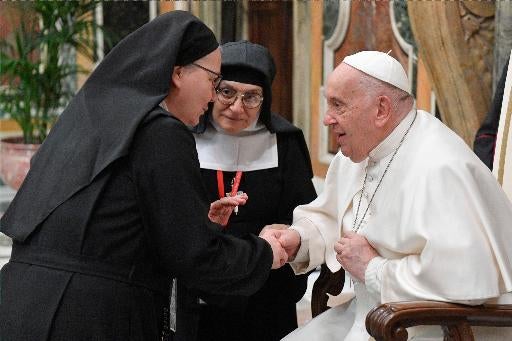Pope urges reparation to the Sacred Heart, including for abuse crisis
VATICAN CITY (CNS) — The spiritual practice of reparation “may be somewhat forgotten or wrongly judged obsolete” today, but it is essential for the promotion of justice and healing, including on behalf of those who have suffered abuse in the church, Pope Francis said.
With a sincere commitment to reparation, the hope is that even “if the irreparable cannot be completely repaired, love can always be reborn, making the wound bearable,” the pope said.
Pope Francis met May 4 with participants in a conference marking the 350th anniversary of the 17th-century apparitions of Jesus to French St. Margaret Mary Alacoque, which included his call to promote devotion to his sacred heart and to make acts of reparation or penance for the times people have not recognized Christ’s love.
Reparation is a concept found throughout the Bible, the pope said. “In the Old Testament, it takes on a social dimension of compensation for evil committed,” being a matter of justice such as returning something that had been stolen or repairing something that was damaged.
“In the New Testament, however, it takes the form of a spiritual process, within the framework of the redemption brought about by Christ,” the pope said. “Reparation is fully manifested in the sacrifice of the cross. The novelty here is that it reveals the Lord’s mercy toward the sinner.”
“Reparation therefore contributes to people’s reconciliation between themselves, but also to reconciliation with God, because the wrong done to our neighbor is also an offense to God,” he said.
In the Book of Sirach, the pope said, the author asks, “Do not the tears of the widow fall down the cheeks of God?”
“Dear friends,” he said, “how many tears still flow down God’s cheeks while our world experiences so much abuse against the dignity of the person, even within the people of God,” the church.
The title of the conference in Rome was “Repairing the Irreparable,” which Pope Francis said was an invitation “to hope that every wound can be healed, however deep it may be.”
“Full reparation at times seems impossible, such as when goods or loved ones are definitively lost, or when certain situations have become irreversible,” he said. “But the intention to make amends and to do so in a concrete way is essential for the process of reconciliation and the return to peace in the heart.”
Reparation as a spiritual practice, the pope said, must include “recognizing oneself as guilty and asking for forgiveness,” because it is from an “honest acknowledgment of the wrong done to one’s brother or sister, and from the profound and sincere sentiment that love has been harmed, that the desire to make amends arises.”
The explicit request for forgiveness “reopens dialogue and manifests the will to re-establish the bond of fraternal charity,” he said. And a commitment to reparation — “even a beginning of reparation or simply the will to make amends — guarantees the authenticity of the request for forgiveness, it expresses its depth, its sincerity, it touches the heart of the other, bringing consolation and inspiring the other to accept the request for forgiveness.”
Jesus’ request to St. Margaret Mary for acts of reparation for the offenses caused by the sins of humanity indicate that “these acts consoled his heart,” the pope said. And if they consoled his heart, “this means that reparation can also console the heart of every wounded person.”
Pope Francis prayed that the conference would renew and strengthen “the meaning of this beautiful practice of the reparation to the sacred heart of Jesus” and that it would find “its rightful place in the penitential journey of each baptized person in the church.”
